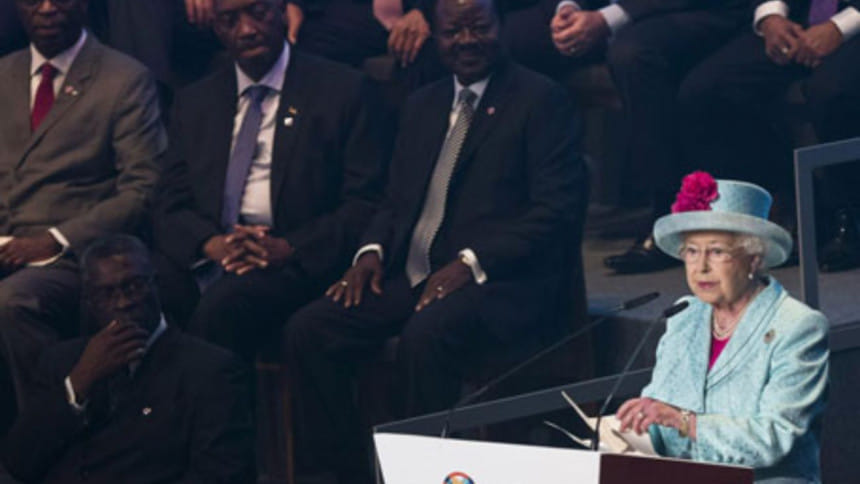Reinventing the Commonwealth

In 1973, the Commonwealth's leading economy, the UK, finally joined the European Economic Community (EEC) to the dismay of other members. This was seen as a decisive commitment to continental Europe, signifying a sharp downgrading of British attention to the Commonwealth. But the Commonwealth survived that blow, not least because of the devotion of Queen Elizabeth to its peoples and ideals, but also due to the extent other member countries shared its values and valued its services.
The Commonwealth links 52 member states across six continents and has a combined population of 2.4 billion. Headed by the Queen of Great Britain, the Commonwealth brought former colonies together to foster greater cooperation, parliamentary democracy, freedom of press, good governance, peace, and cooperation in the cultural and socio-economic development of member states. Membership is voluntary and members can choose to leave it, as Pakistan did in 1972 to register its protest when the Commonwealth recognised Bangladesh as a sovereign state.
Now with Brexit marking another sharp turn in Britain's policy orientation, and risking a considerable reduction in UK trade with the EU, there is a new UK interest in free trade deals cultivating wider global markets. This in turn has led Brexit supporters to a revived recognition of the hitherto neglected trade potential of the Commonwealth. A Commonwealth Business Forum meeting in Malta last November reaffirmed defence of free trade and drew attention to work already underway, helping over 30 smaller Commonwealth member countries to integrate into the global trading system and develop their competitiveness.
The Malta initiative led to a London meeting in March 2017 of trade ministers and representatives from 35 Commonwealth countries including Bangladesh. This trade and energy meeting noted that despite the huge diversity of Commonwealth member states in size and development, trade between them had been growing faster than the world average. It is expected to total over USD 1 trillion by 2020. This faster growth was hailed as the 'Commonwealth advantage'. Studies had shown trading costs were 19 percent lower between Commonwealth countries, as compared with the global average. This surprisingly substantial cost advantage was explained as arising from legal and administrative similarities between Commonwealth members and from the trust created by the Commonwealth's long background of mutual ties and organic growth. It was agreed to improve coordination between member countries' institutions and the private sector. Private sector representatives present at the meeting recognised the advantage of working closely with the Commonwealth Business Forum. Britain is working closely with the private sectors of Commonwealth countries before the next Commonwealth Heads of Government Meeting (CHOGM) to be held in April 2018 in London.
This Commonwealth advantage is a notable, but hitherto little recognised factor in global trade. The UK may well try to develop this as part of a post-Brexit drive to focus on new global markets outside the EU. But could it also mean that the Commonwealth might have a significant new potential role for all its members as a global trading body?
Many UK right-wing conservative Eurosceptics claim that new trade deals with Commonwealth and other countries could more than compensate for any loss of easy access to the EU single market. They believe that EU membership has hampered Britain from taking full advantage of massive new markets opened up in Asia and other fast developing regions in the Commonwealth. Many others, including much of UK business, strongly dispute this.
Even if some Eurosceptics are over-ambitious, that still does not mean that the Commonwealth advantage could not be fostered and developed to the advantage of all member states. The London meeting of trade ministers recognised this and work is going ahead to formulate recommendations for new ways to promote trade and investment. These will be presented for consideration at the 2018 London CHOGM. One idea certain to be considered is the adoption of a visa-free system for business visits between Commonwealth countries. Moreover, there are already other Commonwealth organisations which can be further strengthened such as the Commonwealth Business School, the Commonwealth Youth Programme and the Association of Commonwealth Universities and Commonwealth Scholarships. Some in Britain hope to create a Commonwealth free trade area compliant with WTO rules.
A new UK Commonwealth minister has been appointed and ministerial and official meetings are taking place to realise the Commonwealth's full potential. This potential goes far beyond trade and investment. There is a growing threat of violence and extremism in this globalised world. Since the 2016 CHOGM Britain and Australia have funded a new unit in the Commonwealth to counter violent extremism. It will enable members to share experiences, expertise and strategies to protect their citizens better. Moreover, human rights and freedom of press are being given top priority before the next CHOGM.
The aim of the next CHOGM in April 2018 is to "firmly reposition Commonwealth as an organisation of global importance in the 21st century". One key factor in its future may be South Asia. The central importance of India is recognised, not only as a rising giant economy and a large segment of humanity, but for the depth of old civilisations and cultures in South Asia. Bangladesh, a country whose economic growth has continually risen, can play a major role in trade, investment and counter terrorism.
The Commonwealth 'family' links an immense diversity of people with their own individual histories, cultures and circumstances. There are periodic strains in any family and the Commonwealth is no exception as evidenced when South Africa was expelled from the Commonwealth in the days of apartheid.
Now Britain, after Brexit, aims to generate stronger trade relations with Commonwealth member countries. New trading treaties with major Commonwealth markets like India, Canada, Australia and other fast growing economies like Bangladesh to revive a Commonwealth trading bloc could be mutually advantageous. But will this happen? Will Britain invest enough in money and initiatives not only to enhance its trade and investment but also to promote Commonwealth values?
The writer is a former ambassador.

 For all latest news, follow The Daily Star's Google News channel.
For all latest news, follow The Daily Star's Google News channel. 



Comments